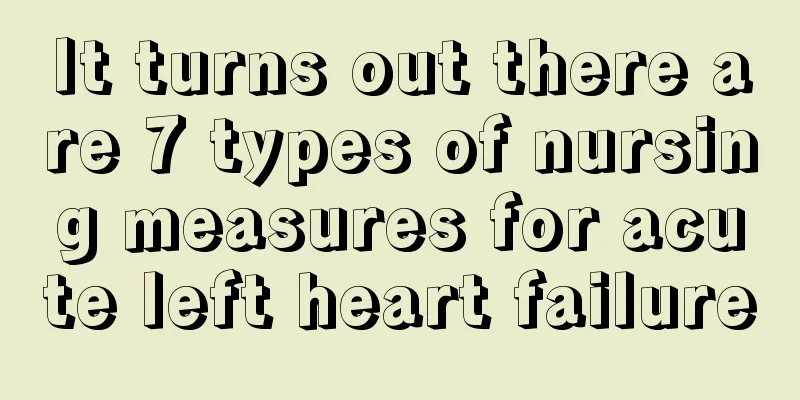The most commonly used antihypertensive drug in nephrology

|
The kidney is the most critical part of the human body. If people have kidney problems, they should be treated in time. But everyone's physical condition is different. When a disease occurs, the treatment methods used are also different. But people should realize that kidney disease may be caused by high blood pressure. So what are the most commonly used antihypertensive drugs in nephrology? Classification of antihypertensive drugs (1) Diuretics: There are thiazides, loop diuretics and potassium-sparing diuretics. The antihypertensive effects of various diuretics are similar. The antihypertensive effect is mainly achieved through excretion, reduction of extracellular volume, and reduction of peripheral vascular resistance. The antihypertensive effect has a gentle onset angle, a relatively long duration, and a long-lasting effect, reaching its peak 2-3 weeks after taking the medicine. It is suitable for mild and moderate hypertension, and has a strong antihypertensive effect on salt-sensitive hypertension, hypertension combined with obesity or diabetes, menopausal women and hypertension in the elderly. The main adverse effects of diuretics are hypokalemia and effects on blood lipid, blood sugar, and blood uric acid metabolism, which often occur at high doses. Therefore, small doses are now recommended. The main adverse reactions are fatigue and increased urine volume. It is contraindicated for patients with gout and renal insufficiency. (2) β-blockers: Commonly used ones include metoprolol, atenolol, bisoprolol, carvedilol, and labetalol. The antihypertensive effect may be through inhibition of central and peripheral RAAS. The blood pressure lowering effect is rapid and powerful. It is suitable for hypertension of varying degrees of severity, especially for middle-aged and young patients with a faster heart rate or those with angina pectoris. It is relatively less effective for hypertension in the elderly. The main obstacles to β-blocker therapy are bradycardia and some adverse reactions that affect the quality of life. Sudden discontinuation of β-blocker therapy at higher doses can lead to withdrawal syndrome. Although diabetes is not a contraindication to the use of β1 blockers, it increases insulin resistance and may also mask and prolong hypoglycemia during hypoglycemic treatment, so caution should be exercised when using them. The main adverse reactions include bradycardia, fatigue, and cold limbs. β-blockers have inhibitory effects on myocardial contractility, conduction and sinus rhythm, and can increase airway resistance. It is contraindicated in patients with acute heart failure, bronchial asthma, sick sinus syndrome, atrioventricular block and peripheral vascular disease. (3) Calcium channel blockers: also known as calcium antagonists, mainly nifedipine, verapamil and diltiazem. According to the duration of drug action, calcium channel blockers can be divided into short-acting and long-acting. Calcium antagonists have few contraindications except for heart failure. Its advantages over other antihypertensive drugs are that it has better antihypertensive effects in elderly patients, and high sodium intake does not affect the antihypertensive effects; it also has a significant antihypertensive effect in alcoholic patients; it can be used in patients with comorbid diabetes, coronary heart disease or peripheral vascular disease; and long-term treatment also has anti-atherosclerotic effects. The main disadvantage is that there is increased reflex sympathetic activity in the initial treatment phase, causing increased heart rate, facial flushing, headache, and lower limb edema. It is not suitable for use in patients with heart failure, sinus node dysfunction, or heart block. (4) Angiotensin-converting enzyme inhibitors: Commonly used ones include captopril, enalapril, benazepril, and cilazapril. The blood pressure lowering effect is slow and gradually increases. ACE inhibitors have the effects of improving insulin resistance and reducing urinary protein. They have relatively good therapeutic effects in hypertensive patients with obesity, diabetes, and heart and kidney target organ damage. They are particularly suitable for hypertensive patients with heart failure, post-myocardial infarction, impaired glucose tolerance or diabetic nephropathy. Adverse reactions include irritating dry cough and angioedema. It is contraindicated in patients with hyperkalemia, pregnant women, and bilateral renal artery stenosis. (5) Angiotensin II receptor inhibitors: Losartan is the most commonly used one. Its antihypertensive effect is slow in onset but long-lasting and stable. The most significant feature is that it has few adverse reactions directly related to the drug, does not cause irritating dry cough, and has high compliance with continuous treatment. Although the therapeutic targets and contraindications are the same as ACEI, ARB has its own therapeutic characteristics and is listed together with ACEI as one of the five commonly used antihypertensive drugs currently recommended. ( |
<<: What blood pressure should I take antihypertensive drugs?
>>: Why does soaking your feet in mugwort cause itching
Recommend
What are the methods of using eye mask ice pack
With the arrival of summer, the weather will beco...
Insomnia is probably caused by not using the right pillow
No matter how long they sleep, many middle-aged a...
Scrub shoes cleaning
Matte shoes are also a common type of shoes. Comp...
Benefits of doing sit-ups every day
Sit-ups are the simplest form of exercise and the...
What is the value of bitter chrysanthemum
We know that when the Double Ninth Festival comes...
What are the early symptoms of gastric cancer?
What are the early symptoms of gastric cancer? Th...
The correct way to remove freckles with olive oil
When faced with pigmentation, everyone will go to...
How to make bird's nest nutritiously
The nutritional value of bird's nest is relat...
3 Chinese herbal prescriptions that can be used to treat lung cancer
Lung cancer causes physical and mental pain to pa...
How to prevent allergic reactions to paclitaxel in the treatment of ovarian cancer
In clinical practice, paclitaxel can be used for ...
What are the reasons for high urine creatinine?
If a casual physical examination reveals that you...
Unexplained fever with no other symptoms
Generally speaking, fever is a symptom caused by ...
What are the drugs used in clinical chemotherapy for colorectal cancer
In 2008, there were approximately 1.2 million new...
Is it harmful if a new bed has a smell?
The bed is very important to us. It is our place ...
How is white hair formed
There is often a saying that one's hair turns...









